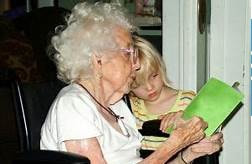 Seeing a loved one nearing the end of life can be an overwhelming experience. For children, it can be extremely emotionally traumatic. Why should children visit their dying grandparent? It will be hard for the child not to feel upset or afraid when facing inevitable death of one they love. Often, a dying grandparent may be confused or disoriented and unable to answer your child's questions. This is unlike the grandparent the child knows and loves and can cause real confusion and fear. But the benefits of a visit to a dying grandparent far outweigh the risks. For one, a grandparent's comfort is vital. A visit, even just for a short time, is likely to improve the patient's wellbeing, while reducing the distress and anxiety of the child. The 'mystery' of what is happening is revealed in real time and, as the child considers, he or she will begin to understand the cycle of life. Another benefit is a chance for the child to establish a new kind of relationship with their grandparent. For some children, a dying grandparent may be the only person that the child has ever known who is at the end of their life. Such a bond can be special and provide a valuable source of support and comfort during what can be a frightening and anxious time. What are the benefits of visiting a dying grandparent? Visiting a dying parent or grandparent can benefit a child in several ways. Here are just some of the reasons you may want to take your child to visit: Reminds children of life’s fragility, and to appreciate everyday living. A visit helps children to process their emotions and feelings. A visit makes them more open to talking about their emotions and how they feel, especially around parents. It inspires a love of life, family, and traditions. It is a bonding experience between grandparent and grandchild Is a teachable moment to discuss death. You may not want your child to visit a dying parent or grandparent until he or she is ready to handle the experience, but working on preparing for the event is terribly important. What are the risks of children visiting a dying grandparent? It’s possible for children to be caught up in the emotional turmoil of seeing a dying grandparent. According to WebMD, children might: Feel frightened and confused. Run to someone for help. Feel depressed or have a temper tantrum. Get upset or too close to the person, as if they are trying to hug the person. Have nightmares. Feel anxiety. What should parents do if their child doesn’t want to visit a dying grand parent? They should help their child work through their feelings by describing it. It’s also helpful for parents to share their own stories about dealing with death and the loss of a loved one. It may help their children realize that the end is a natural part of life and not a tragedy. How to prepare your child for visiting a dying grandparent. My grandfather died right before Christmas and I remember sitting in my parents' living room trying to explain the gravity of the situation to my little sister. She was only seven. Seeing my grandfather so sick was terrifying. I remember visiting him in the hospital and holding his hand and feeling so scared. I wasn't ready to lose him and the thought of him not being there seemed inconceivable. The only way I could cope with his death was to dream about him. During his illness, I would have dreams about him going to the bathroom or a taxi coming to take him to the hospital. I believed I was on a holiday with him. I didn't know it was only a dream. Conclusion As with almost any stressful situation, I recommend having your spouse or another supportive adult with you to help you navigate these situations. Many times, children will feel comfortable enough to talk to the person who is dying. You can help them develop a new and sometimes deeper relationship with the person they are caring for during the last few months of life. However, you should never force your child to be around a dying loved one. Children may see their loved ones suffering and may suffer from their own anxiety as well. If your child experiences anxiety while caring for a person in the last days of life, it is best to seek the guidance of a counselor to help him or her through this time. You may not be in need of a eulogy right now, but we're happy to let you know that we'll always be here for you. When the need arises, we can help you write a beautiful tribute that captures your loved one's life. TheEulogyWriters.com
0 Comments
Your comment will be posted after it is approved.
Leave a Reply. |
Archives
July 2024
AuthorSteve Schafer is the founder of TheEulogyWriters and the author of hundreds of heartfelt, wonderful eulogies. He lives in Texas and has been writing eulogies for well over thirty years. The articles in this blog are designed to help people through the process of losing loved ones and exploring issues in the aging process. |
|
The Eulogy Writers
4092 Old Dominion Dr. West Bloomfield, MI 48323 |
Writers: Steve Schafer, Ralph DiBiasio-Snyder, Abi Galeas, Miriam Hill
Steve's Personal Cell Phone: (734) 846-3072 Our email address is: [email protected] |